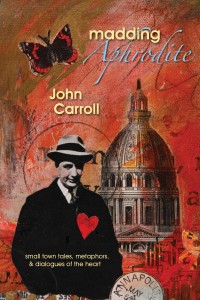By Alex Rake (The Cascade) – Email
Print Edition: January 7, 2015

Madding Aphrodite, a book of “small town tales, metaphors, & dialogues of the heart” by UFV English professor John Carroll, is a delightfully strange and often funny piece of work, albeit with a few distracting weaknesses.
Structured as several (at first) unrelated passages of prose-poetry divided into a calendar of months, the book unravels its story using conversations between abstract concepts, love affairs with aliens, and short tales about people searching for things they cannot quite define. In short, it’s a weird ride.
Carroll opts not to use traditional grammar, replacing most punctuation with spaces of varying length. This makes the passages resemble thought: statements triggered by statements without being planned beforehand. The speakers therefore reveal themselves through their streams-of-consciousness, and this gives their words the weight of honesty with all of honesty’s potential for humour and heartbreak.
The best thing about the book is its sense of humour. By forcing the opposing forces of life, such as Love and Lust, into conversation (or in this case, a slap-fight), Carroll reveals a lot of the absurdity hiding in life’s basic positions. In one passage, Loner and Family Man have their yearly conversation, and after Loner explains all his fears and desires and why family is a confining force, Family Man cannot comprehend this and responds automatically, “Without family you have nothing.” Moments like this manage to be serious and funny at the same time, and this dissonance keeps the book engaging.
One potential problem with the writing is that the speakers’ streams-of-consciousness occasionally repeat ideas in rapid succession, sometimes to the point where it feels like an accident on Carroll’s part. For example, in a passage called “latte & cappuccino,” the narrator describes a character named K: “he just couldn’t tell … he was afraid to make a choice because he could not decide which was best / he could not decide / period … he just didn’t know how to discriminate / just didn’t know.” Because the passages focus on narrative — that is, the information in the passages demands more attention than the structure of that information — the repetition grates without successfully revealing anything significant about the characters’ headspaces beyond where we already know their heads are stuck.
Another problem that blemishes the book is the frequency of small typos. One or two would not be a big deal, but there seems to be one hiding every 20 pages or so, especially near the first half. It really puts a damper on the reading experience because it makes the book feel unprofessional, not to mention it interrupts the reading itself. Then again, it is a large work in its first printing, so this issue can disappear if the publisher decides to print a second edition.
Despite some small bugs, Madding Aphrodite is worth the read. While its philosophizing probably won’t blow anybody’s mind, the book has an at-once playful and serious attitude that you cannot always find in contemporary prose-poetry — at least, not done this engagingly.



